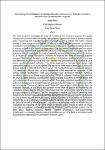Monitoring And Evaluation on Quality Educational Outcome in Primary Schools in Masindi District, Mid-Western Uganda
Date
2021Author
Asaba, Irene
Jehopio, Peter Jegrace
Apio, Sarah Okite
Metadata
Show full item recordAbstract
The study sought to investigate the level of monitoring and evaluation required for quality
educational outcome in Masindi district, Mid-Western Uganda since there is growing need for
better monitoring and evaluation system in education, as the district falls below national
average in both numeracy and literacy at primary school level and moreover, an academic
investigation into the influence of monitoring and evaluation on quality educational outcome
in primary schools in the district has been done . This has created knowledge gap from which
academicians, governments and international community could benefit. It was based on three
objectives mainly: to analyzed the level of materials required in to Monitoring and Evaluation
so as to ensure quality educational outcome, to examine the level of financial outcome
resources required into Monitoring and Evaluation so as to ensure quality educational outcome
and determine the level technical expertise required into Monitoring and Evaluation so as to
ensure quality education outcome. The study employed a cross-sectional design with
quantitative method in the investigation. The researcher used random sampling to select 160
primary schools in Masindi district from which 160 headteachers were purposively selected.
The researcher collected data by using questionnaire that measured the responses of 160
primary school headteachers. Data was analyzed using descriptive statistics, ANOVA,
correlation statistics and linear regression using STATA15 software. Findings indicated that
the level at which technical expertise into Monitoring and Evaluation performed better than
both material and financial resource input in M&E. There was a statistical significant difference
in level of resources between the “financial” construct and the “material” construct (p=0.000)
and between the “Technical” construct and “Financial” construct (p = 0.000). Further, from the
regression analysis, it was found the variation in the level of quality of Monitoring and
Evaluation process directly influence educational outcome. Additionally, regarding the level
of output frequency of Parents Teachers Associations meeting and school ownership were
found directly influence educational outcome. Recommendations arising from the study points
out that primary schools should increasing budget allocation to Monitoring and Evaluation
components, so as to improve educational outcome. Besides, all school administrators should
be formerly trained in Monitoring and Evaluation and refresher course on Monitoring and
Evaluation run regularly on the same group. Necessary action should be taken to ensure
systematic and genuine coordination between the Monitoring and Evaluation systems and the
other stake holders, including Parents Teachers Association, Non-Governmental
Organizations, community organizations and beneficiaries such that there is transparency and
accountability established and continuality improved upon.

